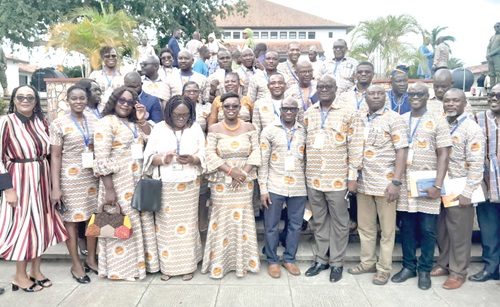
GAUA expresses concern over delays in approval of condition of service
The Ghana Association of University Administrators (GAUA) has expressed concern about delays in granting approval by the Ministry of Finance (MoF) for the implementation of negotiated conditions of service for its members.
GAUA noted that “though agreements have been reached over the payment of fuel and fuel-related allowances, sanitation and security allowances, it has taken over two months for the MoF to grant the necessary approval for the payment of these allowances”.
In a communique issued and signed by the newly sworn-in National President of GAUA, Michael Owusu Ansah, and the General Secretary, Augustine Amissare, following the end of a three-day national congress at the University of Ghana (UG) in Accra last Friday, the association called on the MoF to expedite action on the release of the said approval letters to avoid the reactivation of any industrial action.
It also “rejects any attempt by the Ghana Revenue Authority (GRA) to tax the Book Allowance of its members as this has the potential to cause labour unrest, instability and chaos on the various university campuses”, adding that it was unfair as same allowance for the teaching staff is not taxed by the GRA.
GAUA also registered its displeasure over the unfair representation of university administrators and professionals on relevant government boards and agencies, and called on the government to ensure fairness.
“Systematically, university administrators and professionals have been left out in government appointments to regulatory agencies such as Ghana Tertiary Education Commission (GTEC). GAUA, therefore, calls on this government as well as future governments, to ensure fairness and equity in the appointment of personnel onto relevant government boards and agencies,” it stated.
It further raised concern about the disparities in the placement of university administrators and professionals on the Single Spine Salary Scale (SSSS) as they were placed lower than what was agreed on migration to the SSSS.
“GAUA has consistently drawn the attention of the Fair Wages and Salaries Commission (FWSC), the National Labour Commission (NLC) and GTEC to the existing disparities in the placement of university administrators and professionals on the Single Spine Salary Scale.
University professionals and administrators have been placed lower on the SSSS contrary to what was agreed on migration to the Single Spine Salary Structure,” it said.
This, GAUA said, had continued, creating serious dissatisfaction and agitation among members of the association as it undermined the principle of fairness and equity.
At the Congress, the National President of GAUA, Mr Ansah, said GAUA observed that some public universities ran a 4-tier ranking system for senior members — administration and professional — while others ran a 5-tier system, resulting in placement differences across public universities.
Some administrative and professional senior members, therefore, retired from the university with a smaller retirement benefit than expected.
He called on “GTEC and the various university councils and managements to correct this inequitable, obnoxious and shameful policy as a matter of urgency” to not only ensure fairness and equity in the conditions of service of university administrators and professionals, but also guarantee harmony on various campuses for the smooth running of the academic calendars of the universities.
Election
Mr Ansah welcomed government’s intention to establish more public universities. However, it urged the government to provide the needed infrastructure and resources for the proper running of these new universities and also provide the existing universities with adequate resources to ensure quality teaching and learning.
He added that GAUA, as a major stakeholder in the tertiary education landscape, expected the political parties to develop policies that would improve the working conditions of university staff, provide jobs for our youth and improve the living condition of the citizenry.
Congress
All university administrators from the 15 public universities across the country participated in the congress. It was on the theme: “Balancing growth and sustainability in expanding public universities — the role of GAUA”.
It also saw the swearing-in of the new national executive who are taking over the affairs of the association for the next two years. They include the National President, Michael Owusu Ansah; Vice-President, Philip Quaye; Secretary, Augustine Amissare; Assistant Secretary, Albert Adjekum-Essuman; Treasurer, Alex Nii Crabbe and the Editor, Samuel Y. Amebley.
The new executive took over from the previous administration led by Dr Beth Offei-Awuku as President; Vice-President, Prince Percy Kwamena Mbir Taylor; General Secretary, Richard Afriyie; Assistant Secretary, Patricia Kaitoo; Treasurer, Emmanuel Kwesi Botwe; National Editor, Reginald Agbo, and Online Editor, Seth Tompoli.
